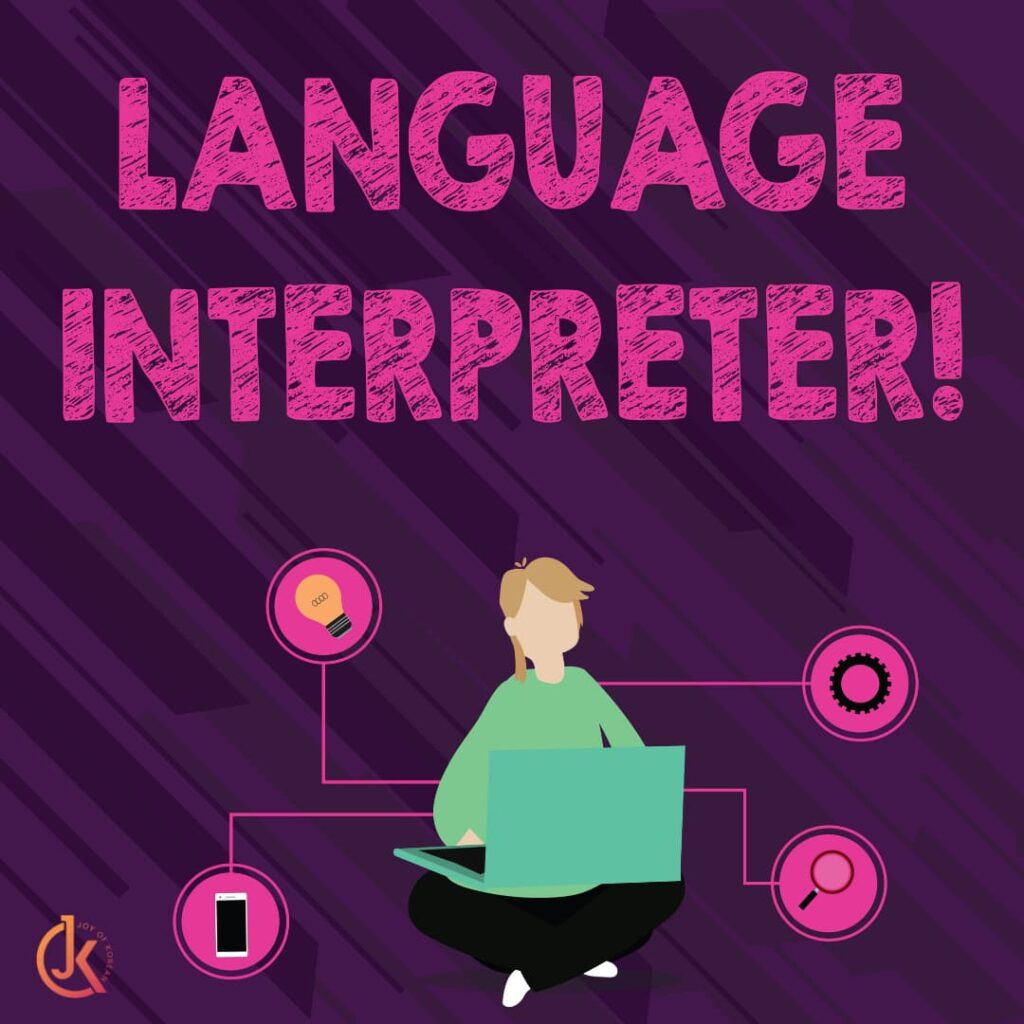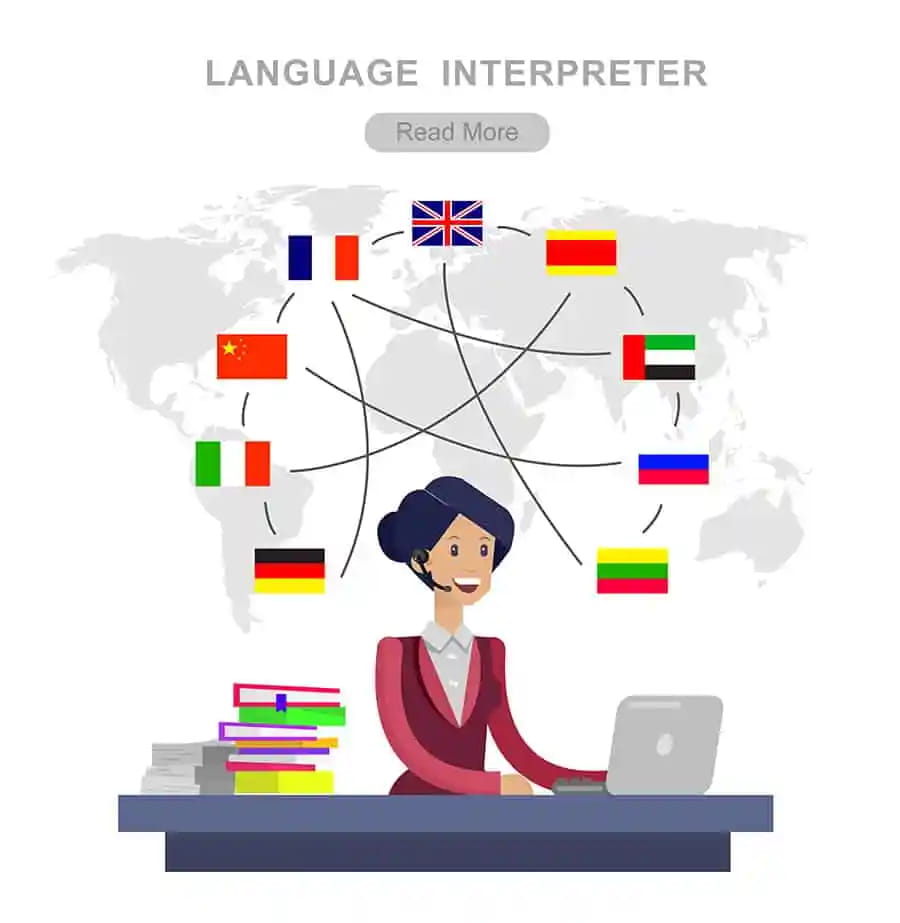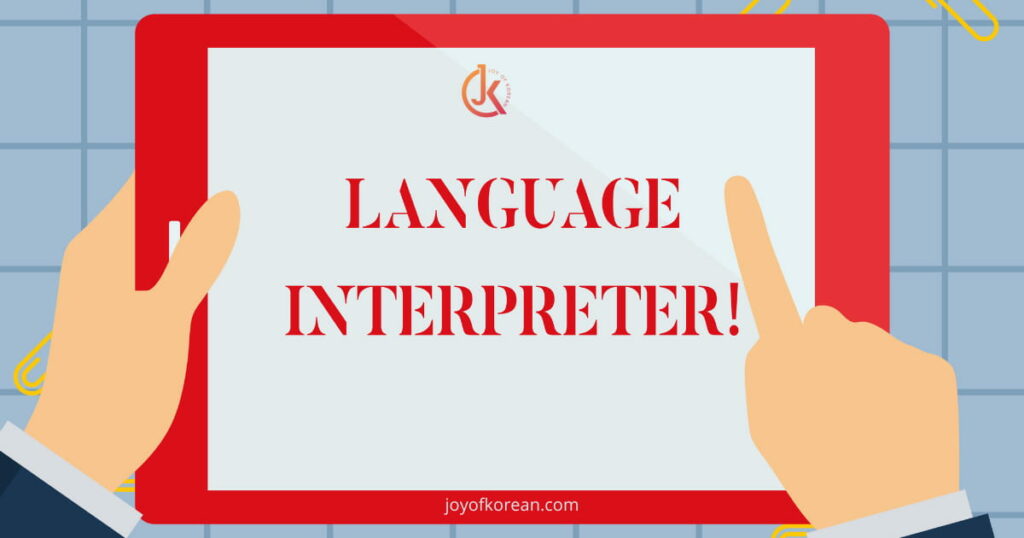One of the most sought-after jobs that require Korean is interpreting.
That makes sense. No?
South Korea’s flourishing economy, cultural aspects like K-pop, Kdrama, the upward trend of international business, and entertainment content fame are the top reasons to learn Korean.
The career path of a Korean interpreter can be rewarding and challenging for those who enjoy languages and cultures.
Many job opportunities are available to those with Korean skills today. It is possible to earn a high salary. This is why more and more people are interested in studying Korean.
You have come to the right place if you want to learn this language to become a Korean interpreter.
This guide will tell you everything you need about a career in this field. This article covers various elements, such as job types, requirements, prospects, salaries, advantages, and disadvantages.
Let’s get started!
TABLE OF CONTENTS
- How does a Korean interpreter work?
- How an interpreter differs from a translator?
- Korean interpretation jobs of various types
- (i) Simultaneous interpretation
- (ii) Chuchotage or whispered interpretation
- (iii) Consecutive interpretation
- (iv) Telephone Interpreting (Over-the-Phone / OPI)
- (v) Travel interpretation
- (vi) Liaison interpreting
- (vii) Bidule interpretation
- (viii) Relay interpretation
- (ix) Business or negotiation interpretation
- Advantages of Korean Interpreters
- Disadvantages of Korean Interpreters
- What are the requirements for becoming an interpreter?
- How long it takes to become a Korean interpreter?
- How much does a Korean interpreter make?
- Where can I find job opportunities?
- Wrapping Up on a career in Korean interpretation
How does a Korean interpreter work?

Real-time interpretation is always provided by those who have excellent speaking skills. By using these tools, native Korean speakers and non-Koreans can communicate more effectively.
Interpreters must ensure that the original message’s intent is accurately conveyed. Cultural nuances and etiquette errors are also taken into account.
In different settings, surroundings, and setups, they operate differently. Government bodies, international organizations, private companies, agencies, and freelancers are all examples of these organizations.
Candidates should have a good understanding of the target language and a high proficiency in Korean. One also needs to speak clearly, interpret well, and be confident.
Specialization or specialized knowledge is shared among interpreters. These include the legal, IT, medical, finance, scientific, and engineering fields.
You can travel and gain a deeper understanding of cultures if you take on the role. In addition to exploring the local foods, arts, history, music, and festivals, you can also learn about Korean culture.
You will have customers from various industries, businesses, and fields. As a result, freelancers have plenty of opportunities, whether they work full-time or part-time.
Translation of conversational content into another language is what you do. E.g., you can create television and internet subtitles using online interpretation tools.
How an interpreter differs from a translator?
Professional interpreters translate spoken languages between source and target languages in real time. In contrast, Korean translators translate written texts from one language to another.
A translation involves writing, whereas an interpretation comprises speaking.
The ability to speak two languages fluently is essential for practical interpretation. Think and communicate in near-real time in critical and necessary.
Translation can be done slowly, using other materials and sources to aid. Because the work takes time, you don’t need to be proficient in the target language. The process is simpler than interpretation because of this.
Providing interpretation between two or more people can be demanding and fast-paced. Despite this, translating and interpreting require similar skills, requiring a higher level of expertise.
Korean interpretation jobs of various types
Interpretation has changed constantly in terms of methods and scope. So, organizations also have different needs.
There are many ways in which works are interpreted today. Korean interpreters can be classified into the following nine types.

(i) Simultaneous interpretation
These systems are used for significant events such as conferences, meetings, and training sessions. During real-time translation, the speaker listens to and comprehends what is said.
There is still a delay of a few seconds in this. An interpreter can only understand a correctly interpreted text once they comprehend it.
Interpreting this work is challenging and decisive because of its nature. And they are always on alert and active during the project.
If delayed, the speaker may lose a few words or even the entire idea or sentence. It is unacceptable to act carelessly or incompetently.
(ii) Chuchotage or whispered interpretation
Whispered interpreting involves listening to and analyzing the message before whispering it to the client. After that, the interpreter translates the message into the client’s preferred language.
Chuchotage is similar to simultaneous in terms of difficulty and intensity. They hear, understands, translate, and deliver speeches simultaneously in the target language.
It is suitable for smaller meetings with fewer participants because of the nature of the work and the low voice. Yet, conferences, for example, are too large for this method to work.
(iii) Consecutive interpretation
The second style is back-and-forth interpretation. News conferences, court cases, and business meetings are short-duration events.
Consecutive interpretation is provided by an interpreter standing near the presenter. Usually, speakers stop speaking in their native language after a few minutes.
This sentence usually concludes a topic, opinion, or paragraph. Then, after listening silently for a few sentences, they repeat what they hear in the target language.
When interpreting this way, it is necessary to take notes. The ability to memorize an entire paragraph without losing details is rare.
(iv) Telephone Interpreting (Over-the-Phone / OPI)
Scheduled interpreting can be simultaneous or consecutive. Instead of an in-person appointment, the appointment is conducted via telephone interpretation.
When participants are comfortable hearing only the interpreter’s voice, simultaneous telephone interpretation can be conducted. Alternatives include scheduling them back-to-back.
These methods have some limitations. Without seeing speakers or their bodies, they must be more accurate. Without linguistic clues, meaning and context cannot be interpreted.
(v) Travel interpretation
Interpreters need to be fluent, accurate, and culturally aware in the same way as tour guides.
They help tourists and customers with language barriers reach their destinations by escorting them. Further, it is essential to understand the client’s whereabouts, local customs, and language skills.
It takes more than just interpreting skills to be a traveling interpreter. It allows you to book a taxi or hotel, order food, and close a deal on a big scale.
(vi) Liaison interpreting
This mode of interpretation does not require note-taking, and communication occurs both ways. The method is also a standard one.
They are the ones who work as liaisons and interpret between people or organizations informally. This technique does not need word-to-word interpretation since it is less accurate than consecutive.
(vii) Bidule interpretation
The Bidule interpreting system includes a portable receiver and transmitter. Thus, a cabin is optional for simultaneous translation in this approach.
A transmitter translates from one language to another through a microphone. Audience members use headphones to listen to the translation.
A small group or informal event, like a corporate retreat or seminar, best fits the service. It does not require specialized technicians to use or carry. The cost is also inexpensive.
(viii) Relay interpretation
There is a benefit to relay interpretation when there is no interpreter available for a particular language pair. This type of service provides multi-interpreter services.
You may need a Swedish-to-Romanian translation, for instance. You will use a widespread language like English to hire a professional who speaks Swedish less commonly. The final result will be Swedish to English to Romanian.
There is a more significant time and cost involved in this process. Yet, this is the only method for completing the critical task when no option exists in a particular language pair.
(ix) Business or negotiation interpretation
Negotiation interpretation should facilitate communication in commercial negotiations. Small groups work well if a responsible and precise member is involved.
You use an interpreter with experience with such discussions. They also must have the time to prepare and the skills to do so.
Advantages of Korean Interpreters
It is invaluable to learn Korean for interpreting work. The following are a few of them:

(i) A growing Korean-speaking market
Korean-speaking markets have experienced significant growth in population and economic influence in recent years.
Korean is spoken in South and North Korea. Yet, it also has plenty of speakers from various other nations, including the USA, China, Japan, and Southeast Asian countries.
There are many vital factors contributing to the Korean-speaking market growth.
The economic powerhouse and its advancements in technology and the automotive industry. This economic growth has increased interest in Korean products and services, creating a demand for Korean language skills among businesses and individuals.
The Korean wave has spread worldwide. K-pop music, K-dramas, movies, and fashion have gained immense popularity, attracting a diverse fan base. This cultural phenomenon has sparked significant interest in learning Korean among non-native speakers.
South Korea is a big player in international trade and has established strong business relationships with countries worldwide. It has also become a popular tourist destination, attracting millions yearly visitors.
The growing popularity of Korean language education and cross-cultural exchanges has also encouraged people from different countries to learn Korean to understand Korean culture better, build relationships, and participate in academic and professional discussions.
Given the expanding influence of South Korea’s economy and cultural presence, the Korean-speaking market is expected to grow in the coming years.
This presents opportunities for businesses, language educators, and individuals interested in engaging with the Korean-speaking world.
Korean interpreters can bridge cultural differences and promote understanding.
(ii) A growth in the demand for interpreters
As the Korean economy grows and its global influence grows, interpreters are in high demand.
Korea’s trade extends beyond national borders as it expands into international markets. As a result, studying in Korea has many advantages, and this is one of them.
They are also necessary for foreigners to reach the Korean-speaking market. There are only a few Korean-speaking professionals in this field, which makes it even more attractive. Two reasons can be attributed to this.
Korean speakers have a lower level of English understanding than other nationalities.
This is because most documents have already been translated from Korean to English, and personnel must be able to translate articles into their own languages.
Korean speakers need help with their Korean dialect and accent when speaking English.
When foreigners practice enough, they are more likely to sound Korean. Foreigners, thus, have a greater need for interpretation services.
Interpreters are in high demand in many fields, including health care, law, technology, and trade. Also, they will be in greater need of global communication and travel growth.
(iii) Broaden your horizons
You gain a deeper understanding of human nature when you learn a new tongue. An interpreter should be able to understand the language of the source and target countries to perform well.
The cultural expertise of translators, interpreters, and localizers guides the translation, interpretation, and localization process.
As a result, they produce impressive results that are authentic.
It is rare for them to learn by themselves and work on their own. Yet, by attending conferences, international events, and courses, linguists can develop relationships with other experts and improve their skills.
(iv) Flexibility
Career options for Korean interpreters are diverse.
There are many career options available to them. It is no longer necessary for one’s professional world to be limited to one’s city, state, region, or country with the advent of internet technology.
You can work part-time for a variety of organizations besides working full-time. Explore freelance employment opportunities as a great place to start.
(v) Korean interpreters earn a good salary
A Korean interpreter can expect good salaries, incentives, and other benefits. Professionals with substantial experience are usually awarded these designations.
The earning potential of a job can vary from one to another. Thus, it is also vital to take several factors into account. These factors include the industry, references, domain-specific knowledge, location, and experience.
Their average salary is higher than other language-related careers. Still, sometimes those with specialized knowledge or more experience earn more money.
Most of them are freelancers rather than full-time employees. It is common for employees to be paid on an hourly or project basis most of the time.
Thus, they can earn a higher wage and have more flexibility. But, as a result, they are more likely to experience job instability.
Disadvantages of Korean Interpreters
There are some drawbacks associated with Korean interpreters, as with everything else. Some of them are listed below.

(i) Insufficient subject expertise
Depending on their field, interpreters may need more law, medicine, technology, or engineering knowledge. This may lead to misinterpretations and errors.
A particular industry or field of knowledge requires experience. It is also often necessary to have specific wisdom to define objectives and priorities correctly within a project.
This is more than Korean songs; some may consider it a dream come true. However, knowledge of other fields is equally important as knowledge of politics, history, and technology.
There is usually a great deal of importance placed on contextual considerations. South Korea and other Korean-speaking countries, for instance, have diverse cultures.
There may be a need for interpreters to assist with understanding. Due to this, misunderstandings can arise.
Understanding a specific market, trade, and field is essential for providing high-quality interpretation services. Besides, those with good skills earn good salaries and are highly sought after.
(ii) Fluency in Korean is a must
To become fluent in Korean, learners must gain tremendous knowledge.
The Korean language is difficult; you need advanced skills like TOPIK level 6. But, achieving success at intermediate levels, such as levels 3 or 4, is more challenging.
You look forward to studying, learning, and conducting research in the future. Yet, to be successful in your career, you must stay up-to-date on the news in the Korean-speaking world and study Korean.
It takes a lot of effort to convey emotions and languages in various Korean dialects.
When interpreting spoken languages, it can be challenging to convey sound and feel. Likewise, body language, facial expressions, and nonverbal signs can be tough to understand and share.
(iii) Interpreting is a demanding job
There is always a need for complete concentration in this job. Besides reading and understanding the work, the field, and the purpose, you also need to devote hours and days to the task at hand.
Stress and mental exhaustion are the most common side effects. Information must be constantly listened to, understood, and communicated.
It is possible to work long hours, often in stressful or high-pressure situations, which can exhaust one mentally and physically. It is also possible for misunderstandings or inaccurate information to arise during long periods of interpretation.
Professional interpreters may also need support when interpreting sensitive, unclear, or complex subjects.
(iv) Interpretation work is typically unstable
Interpreters’ work can be affected by many factors. E.g., in some fields, such as government or large corporations, they are more stable and offer more uniform outcomes.
Other areas of employment, such as freelance or contract work, may require more stability. It is typical for this field to have long periods without work.
Most freelancers need help finding regular work and are always looking for new clients. In addition, a lack of extra benefits and perks may further complicate matters.
It depends on the type of job and the industry, whether it is stable or not. To pursue a career as a Korean interpreter, it is a good idea to explore the job market and potential employers first.
What are the requirements for becoming an interpreter?
There are a few requirements for becoming a Korean interpreter. Some of the most important are listed below.

1. Speaking Korean fluently as well as another language
The ability to speak Korean and another language (like English or your native tongue) is required to become a Korean interpreter. Professionally, speaking, reading, and writing are all essential.
To succeed, you need skills beyond the intermediate level. For example, you can take an offline or online Korean course at a university, in private institutes, or through a tutor who offers long-term Korean classes.
Immersion in Korean is the best way to improve your language skills. You can watch movies and TV shows, listen to music, and download apps to study Korean.
You can enhance your language skills by immersing yourself in the language, engaging with it, and exchanging ideas.
Translating, interpreting, thinking, and communicating are usually necessary in most situations. Plus, since you will speak almost like a native speaker, you must also be proficient in Korean.
Some official or recognized institutions require the certification of interpreters by some organizations. It is possible to improve employment prospects by earning a university diploma, a degree, or international certificates like TOPIK.
2. Expertise in a particular domain
Interpreters’ experience in the same field is usually required before being hired. As a result, internships offer excellent opportunities for gaining work experience.
You can put your knowledge into practice by working for some companies on a paid or unpaid internship basis.
Another option is to gain experience through volunteer work. You will gain valuable experience even if you are not paid.
3. An understanding of culture and expertise in a specific field
It is vital to deeply understand Korean culture and customs besides language and interpretation skills. The Korean language, its history, traditions, manners, and practices are included in this need.
The ability to interpret accurately and effectively can be significantly enhanced by understanding the cultural context of a conversation or event. Translation occurs when one translates languages and cultures from one culture to another.
Besides podcasts and music, you can also listen to songs and podcasts. Also, you can improve your Korean skills by seeing films, documentaries, and TV shows for Korean learners.
When interpreting, tone and emotion must be conveyed. As an outcome, idiomatic expressions are represented accurately, besides providing nonverbal communication.
It is helpful to have a basic understanding of Korean culture and traditions. Korean movies can benefit learners, for example.
You can also perform on-site work more efficiently when you can negotiate social settings more effectively.
4. Professionalism and skills in interpretation
The art of interpretation requires practice and training. Consecutive and simultaneous are the two main types.
In consecutive, you listen to the speaker and translate their words into another language. Simultaneously, however, involves solving the speaker’s words as they speak.
The best way to learn these skills is to take interpretation courses, attend workshops and conferences, and practice with other interpreters.
When interpreting, tone and emotion must be conveyed. As an outcome, besides providing nonverbal communication, idiomatic expressions are accurately represented.
The importance of professionalism, reliability, and confidentiality cannot be overstated.
You are likely familiar with many modern technologies. Artificial intelligence powers remote interpretation, telephonic interpretation, and videoconferencing.
Knowing how to use Korean materials is crucial. Research skills for translation require time and effort.
You will also benefit from time-management skills, patience, active listening, and patience. Finally, you should be confident, self-motivated, adaptable, and honest.
After completing professional work, it is vital to discover what you do not know.
Interpreters work in different settings. Often, they adapt based on their subject, environment, and culture. Thus, candidates should be in good physical and mental health.
5. Become certified
Korean interpreters do not need certification, which can enhance their credibility and job prospects.
Many organizations offer certification to them, including private institutions, universities, and government agencies.
To become certified, pass an exam that tests your Korean language and interpretation skills. Testing at the college level or getting the benefits of a TOPIK certificate, etc.
6. Get experience
Korean interpreters must have the experience to succeed. The best way to get experience is to volunteer at local events or organizations, attend job fairs, and network with other interpreters.
Work as an interpreter in various settings, such as healthcare, legal, or business, to earn experience.

How long it takes to become a Korean interpreter?
To become a Korean interpreter, you must first learn the language.
Korean has a complex writing system and pronunciation that differs from English.
A near-native level of Korean is required to thrive as a Korean interpreter. To achieve this goal, one must practice and study for many years.
Many factors decide how long it takes to learn Korean. The length of time can be affected by various factors, such as your approach, learning style, mother tongue, dedication, and time invested.
Korean is rated as one of the most challenging languages to learn by the Foreign Service Institute of the USA (FSI).
They estimate that becoming fluent in Korean will take 2200 hours. With 1:1 classroom sessions and self-study, the total study time increases to 4400 hours.
Typically, it takes three years to reach advanced abilities at Korean HSK level V. You can also pursue bachelor’s and master’s degrees in Korean from a university.
You can attend a language school or university for professional training and certification.
Online resources and Korean learning apps can also help you improve your speaking, listening, reading, and writing skills. Maintaining current skills, continuing education, and practicing cannot be overstated.
After you attain advanced fluency, close to the native level, you can become an interpreter.
Along with your Korean skills, you should also be excellent in English, your native tongue, or another language. It will also be helpful if they are familiar with the cultures and industries that they will translate.
How much does a Korean interpreter make?
A Korean interpreter’s pay can vary. So, it is important to consider many factors, such as the industry, the profile, the location, and the experience level.
Korean interpreters in the United States earn an average of $54,000 a year, according to PayScale. However, depending on the company, it can range from $40,000 to $100,000.
You may find this figure higher or lower depending on your industry. For instance, medical, law, and technology specialists may earn higher salaries than general interpreters.
The money you can earn depends on your experience and location.
For example, Korean interpreters with specialized training may earn more. The average monthly income for Koreans with TOPIK level VI or MA who work as interpreters in India is approximately 75K to 100K.
The starting salary for a fresher with TOPIK levels V or VI certification is approximately 40-50k.
There is more to it than just software. You can earn a seven-figure income if you have experience and fluency like those who have studied TOPIK VI.
An interpreter in South Korea has a typical salary range of €40,000 to €60,000.
Where can I find job opportunities?
Become a Korean interpreter when you reach a higher level of language proficiency.
You have multiple options to choose from. You can also join interpreted communities and contact companies and job portals. Here, everyone can take part in virtual meetings.
There is no limit to the topics you can discuss. E.g., career opportunities, career paths, and related matters.
(i) International organizations and governments
The government needs interpreters to attend meetings and translate documents. It also aims to interact and build relationships with nations worldwide.
The government hires interpreters for a variety of reasons. Such a job may involve translating documents or audio recordings, for example. You can also participate in meetings and events as an interpreter.
There are several local, national, and international organizations. These include international and commercial organizations, diplomatic missions, consulates, and UN employment.
(ii) Korean companies and the private sector
There are many Korean companies around the world where you can work. LinkedIn, for example, is a network site that allows you to look for jobs and connect with other professionals.
You can choose from various small and large commercial and industrial enterprises. In addition, many multinational corporations operate in South Korea or do business with Korean-speaking nations.
A person capable of interpreting paperwork is needed when offering services and products outside the company.
It is a vast industry. Human resources are responsible for handling interpretation. Third parties may also perform work.
(iii) Interpreting agencies and businesses
In addition to conferences and business meetings, Korean interpreters can work in legal proceedings and healthcare settings.
If you have experience, consider applying for this position. Korean speakers appreciate the freedom of freelancers and the rest of the world. As a result, this type of employee is in high demand today.
South Korea and other countries require many interpretation positions. This is because a fabulous deal of commerce passes through the country.
(iv) Freelancer
Experienced interpreters are ideal for this position. The Korean-speaking community appreciates freelancers just the same as anyone else. Today, these types of employees are highly sought after.
There is always a demand for Korean interpreters in many companies. But, due to the more complex language, hiring candidates could be less competitive and more straightforward.
(v) Events and academic centers
Volunteering can help you develop your skills as an interpreter. Some top places to do this are Korean-related events, film festivals, painting festivals, and music festivals.
The experience you gain will be valuable even if you do not get paid.
The university’s Korean department or language school can assist you if you need interpreters. Then, once you feel ready and your teachers agree, you can get out there.
(vi) Korean-speaking places
The high demand for foreign employees always makes Korean businesses look for talented foreign employees. The result has been many countries collaborating with it or signing memorandums of understanding.
The association allows foreign employees to work in South Korea. Therefore, an operation of this nature can cost less by using specific methods.
In South Korea, you can do so many incredible things. However, for your chances to increase, you must pass a Korean language ability test first.
English is taught throughout Asia by native English speakers through several initiatives. In South Korea, for instance, English is the most frequently used language for interpreters and ESL teachers in Korea.
The opportunity to learn a foreign language and gain valuable experience is once in a lifetime.
Wrapping Up on a career in Korean interpretation

Fluency in Korean and an understanding of daily situations are necessary to work as a Korean interpreter. It will also be essential for you to speak another language, such as English or your mother tongue, if needed.
Excellent reading, writing, speaking, and listening skills are also essential. The work could also involve legal and formal matters. As a result, studying the standard form found in textbooks is beneficial.
You will be better positioned to assist if you have interpretation skills, cultural understanding, certification, and experience. Hard work and dedication can help you succeed and bridge cultural and linguistic divides.
Learning Korean can be done with the help of a teacher or a learning center. Besides audio and video lessons, podcasts for studying Korean, books, and apps, you can also use them to learn.
You will have many opportunities and benefits as a Korean interpreter for your career and personal development. Due to its high demand and good pay, it will be a profitable career option.
Being a Korean interpreter is a long journey. You won’t see results immediately, and there will be a learning curve. It’s worth it, though! Your dreams can come true if you work hard and plan carefully!
Become a Korean interpreter and learn Korean to speak fluently.
I hope you found it enjoyable. Comment below with your thoughts or questions.












Working as a translator and an interpreter of Korean to and from English for a few decades, the absorption of English into Korean progressively poses challenges. The Korean phonetic alphabet Hangul lacks certain consonants and vowel combinations. Inserting mangled English words into Korean dialogue impedes communications. Any new English speaker learning Korean discovers they must relearn Korean pronunciations of English words and wrong usages of those words. Even Koreans are confronted with not being able to smoothly communicate due to malpronunciation and wrong usages of English words in the context of their dialogue with one another.Thus, frustration grows followed by the decline of the will to learn.